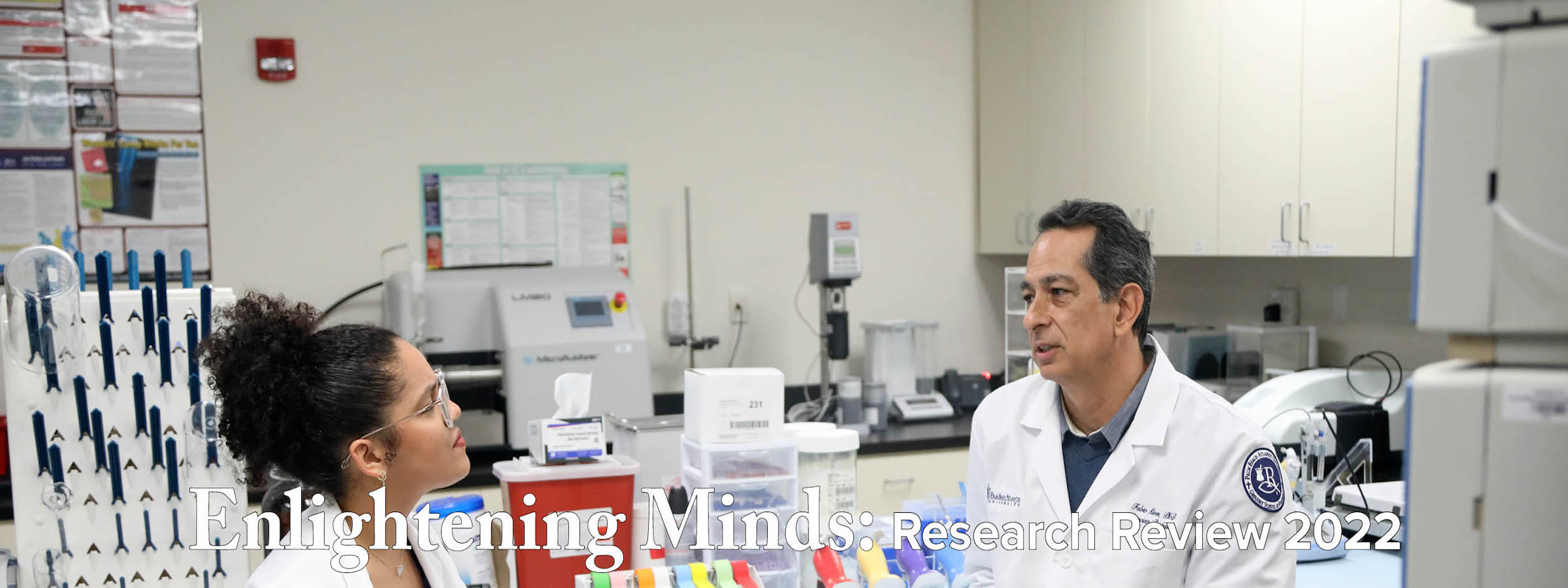
In the Lloyd L. Gregory School of Pharmacy, faith-driven, award-winning professors invite students into research labs to help find solutions to real-world health issues: problems such as Staphylococcus aureus, a major human pathogen that causes what we call staph infections.
Staph infections can kill, says the Centers for Disease Control and Prevention. So researcher Dr. Fabio Aguiar-Alves searches for molecules that can destroy “those very bad bugs.”
Brazilian native Aguiar-Alves earned doctoral degrees in both pharmacy and cellular and molecular biology. His extensive research career includes a Fulbright fellowship at the University of California at Berkeley; training in Yale University’s molecular biology lab; and leading a research group in Brazil’s National Council for Scientific and Technological Development. Working side by side with professionals and students from different countries and different outlooks on life, Aguiar-Alves has sought to be transparent about his Christian faith.
“My research is better because I am Christian, and my teaching is better because I am Christian,” he said. “My faith makes me more concerned about everyone.” He recalls a time when as his faith began to deepen, he sensed this message from God: Just be Christian in everything you do, and people will understand that.
Aguiar-Alves’ work is cited in numerous highly respected scientific journals. He first came to PBA as a visiting scholar in 2019, and in 2022 he joined the faculty as associate professor of pharmaceutical sciences.
“Dr. Aguiar-Alves’ passion for teaching and enthusiasm for research have been invaluable in the classroom and in the lab,” said Dr. Dana Strachan, dean of the Gregory school. “His expertise in molecular epidemiology and pathogenesis of microorganisms allows him to make important contributions to the scientific literature. This, combined with his spirit of collegiality and love for the Lord, make him an ideal member of GSOP.”
Aguiar-Alves is now updating his lab with specialized equipment for research, including an ultra freezer, which will prevent contamination of specimens by keeping the temperature as low as minus 80 degrees Celsius. He will be testing various molecules to see which ones are effective against the Staphylococcus aureus bacteria. He’ll be assisted by “some very brilliant students,” he said, including pharmacy intern Joelys Tardy Vargas, who is from Puerto Rico.
Tardy Vargas previously assisted in research conducted by pharmacy professors Dr. Adwoa Nornoo and Dr. Edwin Santini. She’s learned that as researchers test hypotheses, the results often bring surprises. “During that process,” she said, “you develop your critical thinking, and you can view things from a different perspective. I’ve had the opportunity to open my mind to view those experiences as growing, and not just get frustrated because things weren’t working out like we expected.”
Professors Nornoo and Santini are from Nigeria and Puerto Rico, respectively. Brazilian Aguiar-Alves celebrates the rich diversity he’s found in the Gregory School. Other nations represented among the faculty include the United States, Lebanon, Cuba, Egypt, Tobago and the Netherlands. The 212-member student body is diverse as well: 38 percent Hispanic; 30 percent white; 17 percent Black or African American; 12 percent Asian; and 3 percent of race not reported.
In the classroom, in the laboratory and in the pharmacy school in general, Aguiar-Alves said, the blending of so many different cultures and life experiences “is a powerful combination.”
Photo above: Dr. Fabio Aguiar-Alves discusses staph infection research with pharmacy student Joelys Tardy Vargas.